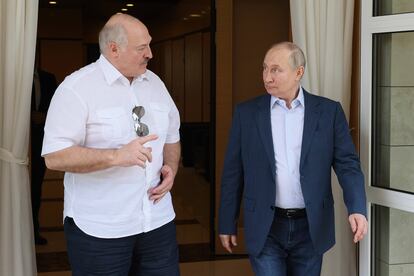The Wagner rebellion in Russia: Notes after a failed mutiny
Aleksandr Lukashenko has the best political instincts in Europe. The Belarusian leader is now in a position to mediate between the Kremlin and the mercenaries, and could perhaps play the role of arbitrator between Moscow and the West

The unsuccessful rebellion led by Yevgeny Prigozhin and his mercenary army, the Wagner Group, invites political reflection and highlights issues to consider in the future. These are some of the main points:
The best political instincts in Europe. Without a doubt, this title belongs to the president of Belarus, Aleksandr Lukashenko, a politician endowed with a formidable survival instinct. Thanks to his actions in the internal conflict between his Russian allies, the leader of Belarus has been able to recover his role as a key intermediary — a position he has played before in the past. From 2014 until Russia invaded Ukraine in February 2022, Lukashenko hosted the OSCE-led negotiations in Minsk to try to find a peaceful settlement between Ukraine and pro-Russian separatists in the Donbas region.
Before then, Lukashenko knew for years how to balance the interests of the West and Russia (and take advantage of both). His shifting politics continued with more or less success until the bloody crackdown that followed the August 2020 presidential election. Putin helped him to resist the massive pressure from the opposition, and to suppress it harshly, which left Lukashenko in the hands of Russia. Many thought that his days of maneuvering between Russia and the West were over.
The Belarusian leader accepted the Kremlin’s conditions as part of its close political, economic and military alliance with Russia and supported it in the invasion of Ukraine. Prigozhin has now provided him with new leeway. And it remains to be seen if the Wagner Group can redirect its energies and actions to the benefit of Belarus.
The Belarusian paradox. Lukashenko is now in a position to mediate between the Kremlin and the Wagner mercenaries, and perhaps play an arbitrator role in a future deal between Russia and the West. And this may be the case despite the fact that, according to updated data from the human rights defense group Vesna, there are 1,496 political prisoners in Belarusian prisons. Among them is Viktor Babariko, who wanted to run against Lukashenko in the 2020 elections and was sentenced to 14 years in prison. Also in jail is the leader of large opposition demonstrations, Maria Kolesnikova, who was sentenced to 11 years.
Belarusian political prisoners receive far less attention than Russian ones. But if Lukashenko feels safe, he could even afford to release some of them, as he has done on several occasions in the past to neutralize the sanctions the West imposed on him for his crackdown on opponents.
Bureaucrat versus farmer. Lukashenko comes from a rural background, while Putin comes from the city. These differences distinguish them. Lukashenko has the intuition of a farmer — he was born in a farming village on the banks of the Dnipro and ran a collective farm. Putin is a more inscrutable and guarded character thanks to his bureaucratic career in state security organs.
The riot was not an operetta. In the 24 hours that the rebellion lasted, blood was spilled and this could have a lasting impact. Prigozhin said he had not hurt anyone, but a former press officer for the Russian Ministry of Defense alluded to more than 20 deaths, mostly aviators, as a result of the downing of seven Air Force aircraft, including helicopters and planes, one of which was performing control tasks.
Two figures from the Russian nationalist group have expressed regret about what happened: Igor Strelkov, a retired colonel of the Russian Security services, and Aleksandr Khodakovsky, commander of the pro-Russian Vostok battalion formed during the 2014 insurgency in Donbas.
Strelkov called on the ”architects of the march for justice” — as Prigozhin described Wagner’s advance towards Moscow — to remember the downed planes and helicopters. “I don’t think anything is over yet,” he said. Khodakovsky, for his part, wrote that millions of people were horrified at the idea that everything they had built in the past years could be erased in a single day. These millions of people, he affirms, “will never be able to look, without condemnation, into the eyes of those who were happy to see the helicopters shot down yesterday fall.”
No two coups are the same. The first and only president of the USSR, Mikhail Gorbachev, had a team of supporters who believed in a change for the better and also had an alternative (timely or not) in the shape of Boris Yeltsin, the president of Russia. The 1991 putschists — high-ranking state officials trying to save the Soviet Union — did not take responsibility for the blood that was spilled to preserve the outdated system they represented. In the opaque system that Putin presides over, we don’t know what the alternative is, but we do know that the coup leaders represented by Prigozhin have no scruples about violence.
Sign up for our weekly newsletter to get more English-language news coverage from EL PAÍS USA Edition
Tu suscripción se está usando en otro dispositivo
¿Quieres añadir otro usuario a tu suscripción?
Si continúas leyendo en este dispositivo, no se podrá leer en el otro.
FlechaTu suscripción se está usando en otro dispositivo y solo puedes acceder a EL PAÍS desde un dispositivo a la vez.
Si quieres compartir tu cuenta, cambia tu suscripción a la modalidad Premium, así podrás añadir otro usuario. Cada uno accederá con su propia cuenta de email, lo que os permitirá personalizar vuestra experiencia en EL PAÍS.
¿Tienes una suscripción de empresa? Accede aquí para contratar más cuentas.
En el caso de no saber quién está usando tu cuenta, te recomendamos cambiar tu contraseña aquí.
Si decides continuar compartiendo tu cuenta, este mensaje se mostrará en tu dispositivo y en el de la otra persona que está usando tu cuenta de forma indefinida, afectando a tu experiencia de lectura. Puedes consultar aquí los términos y condiciones de la suscripción digital.









































